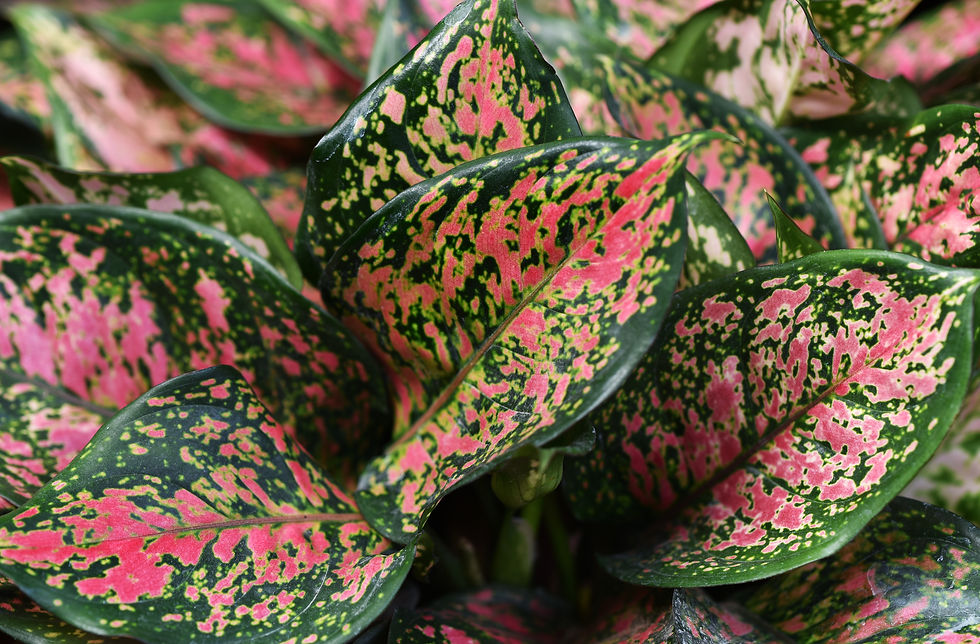Alles over variatie
What is variegation?
A genetic trait of the cultivar that is inherited
..coming soon
What is sport variegation?
Sport variegation is a random genetic mutation. It is when part of a plant shows a morphological difference from the rest of the plant. Sports can be selectively propagated, stabilized, and then be considered a new cultivar. However, some sports do not continue and can be on only a leaf or two.
..coming soon
What is reversion?
A genetic trait of the cultivar that is inherited
..coming soon

Types of Chimeric Variegation
words

Periclinal
When mutated cells are present in the entire layer throughout one or more cell layers. (("Sandwich" variegation.))
Mericlinal
When mutated cells are present in only a fraction of one or more cell layers. (( marble queen pothos? ))))
Sectorial
When mutated cells are present throughout all cell layers in only a fraction of each layer.
ex. solid chunks of variegation, half moon leaves
How to Encourage Variegation
One of the most common questions asked in the houseplant community is "How can I encourage more variegation in my plant?" Well, you can't. It is literally up to the genetics within your plant.
The most common (incorrect) answer to this question is "Give it more light!" Unfortunately light cannot have an impact on your plants genetics any more than the sun can impact your skin. It can change the intensity and sometimes the tones of the variegation, but cannot change the genetics.
That being said, if a plant loses it's variegation and reverts to all green, you can cut the plant back to it's last variegated node (or further). This will cause the plant to put out new growth from a axillary bud containing the mutation and should restore your variegation!

Types of Variegation
In this section we're going to go over the different types of variegation.




Pattern-Gene
A genetic trait of the cultivar that is inherited
Stable variegation.
Seen on:
Maranta
Begonia
Croton
Aglaonema
..coming soon




Chimera
Chimeral variegation occurs when a plant has at least two different sets of DNA. These plants always have the possibility of reverting back to all green. Can be passed on only through stem cuttings.
Typically unstable.
Seen on:
Monstera
Syngonium
Philodendron
& many, many more
..coming soon


Chemically Induced
Chemically induced "variegation" is created by exposing the plant to ethylene gas. This creates a short term variegated look.
This technique was most infamously used on the Philodendron 'Pink Congo' and more recently has been used on Philodendron micans.
Unstable, short-term
Seen on:
Philodendron micans 'Pink'
..coming soon




Blister / Reflective
words
Stable variegation.
Seen on:
Scindapsus
Hoya
Begonia
Peperomia
..coming soon


Pattern-gene + Chimera
Some plants with pattern-gene variegation can also develop chimeral variegation. For example, what we would call a variegated maranta, variegated aglonema, or variegated scindapsus.
-
Seen on:
Scindapsus
Aglaonema
Maranta
& more
..coming soon


Viral
Some variegation occurs from viruses (such as Dasheen Mosaic Virus (DsMV)) changing the colors of a plant. In houseplants DsMV can be found in aroids.
-
Seen on:
..coming soon
Often Mistaken for Variegation
Here we're going to break down some specific causes for things that can look like variegation, but are not.
Unfurling
While some plants are unfurling a new leaf, the exposed and unexposed parts of leaf will be getting different amounts a light resulting in an ombre effect.


Edema
Edema (Oedema) is when leaves become transparent due to inconsistent watering. From the front of a leaf especially, this can almost look like variegation. If you can see it on the backside as well that is a tell-tale sign it's edema and not variegation.




Chlorosis
Interveinal Chlorosis specifically is a yellowing or lightening of the tissue between the veins, while the veins remain green due to a magnesium deficiency. This two-toned look can sometimes be confused for variegation.




Sunstress
Some plants can become sunstressed (sunstress can happen with grow lights as well) and appear a pink or even red color. Sunstress will eventually fade and return to normal coloring over time.












